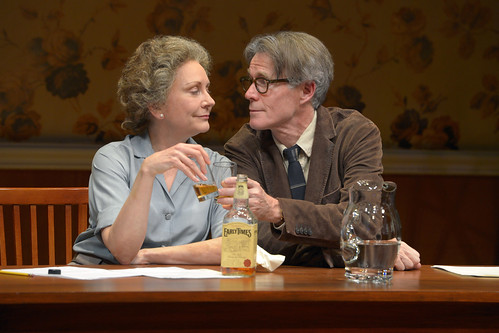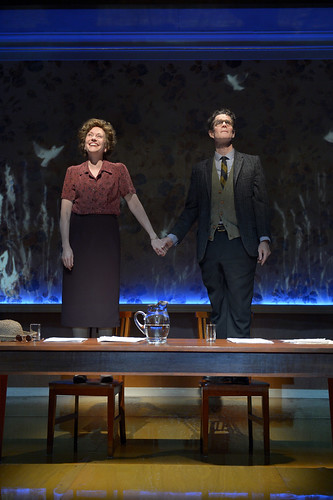Sweet melancholy pervades Berkeley Rep's Elizabeth
 Playwright Sarah Ruhl and director Les Waters return to Berkeley Rep with Dear Elizabeth, starring Mary Beth Fisher (left) and Tom Nelis as esteemed poets and lifelong friends Elizabeth Bishop and Robert Lowell. Below: Though the play consists almost entirely of letters from Bishop and Lowell's 30-year epistolary relationship, there are moments of connection in Ruhl's play. Photos by kevinberne.com
Playwright Sarah Ruhl and director Les Waters return to Berkeley Rep with Dear Elizabeth, starring Mary Beth Fisher (left) and Tom Nelis as esteemed poets and lifelong friends Elizabeth Bishop and Robert Lowell. Below: Though the play consists almost entirely of letters from Bishop and Lowell's 30-year epistolary relationship, there are moments of connection in Ruhl's play. Photos by kevinberne.com
You would never, ever expect to see a production of A.R. Gurney's Love Letters at Berkeley Repertory Theatre. In what has become a staple of community theaters everywhere, a man and a woman sit at a table and read letters from a binder that tell the story of their characters' slowly evolving love story over many decades. It's sweet, it's conventional, it's incredibly cheap to produce. Unless the two actors were Rita Moreno and David Sedaris, this epistolary play would be the antithesis of a Berkeley Rep production.
[side note: as a teenager, on a trip to San Francisco, I saw a production of Love Letters at the former Theatre on the Square starring Colleen Dewhurst and E.G. Marshall and they were wonderful. They were followed in the roles by Matthew Broderick and Helen Hunt; who doesn't think of that foursome in interchangeable roles? And let us please disregard the disastrous Love Letters from 2000 at the Marines Memorial Theatre starring Joan Collins and George Hamilton. Ick.]
All this talk of Love Letters because there's a new two-person, letter-driven love story on the theatrical block: Sarah Ruhl's Dear Elizabeth, which had its world premiere last fall at Yale and is now in Berkeley Rep's Roda Theatre with the same director, former Berkeley Rep associate artistic director Les Waters and one of the same actors.
Though based on letters – real ones – between poets Elizabeth Bishop and Robert Lowell, that's about all this play has in common with Gurney's war horse. That's actually not entirely true. Dear Elizabeth is also a love story of sorts, a deep friendship between admiring poets who brought out the best in each other in their letters for 30 years, even while their lives were plagued with addictions and failed relationships and artistic crises. Theirs is ultimately a sweet story but far from sappy.
Mary Beth Fisher, the holdover from Yale Repertory Theatre (with which this production is produced in association), is Bishop, the hard-drinking lesbian poet and winner of the Pulitzer Prize, and Tom Nelis is Lowell, also a Pulitzer winner and a hard drinker as well as a serial husband and sufferer of manic depression. Their letters, collected in Words in Air: The Complete Correspondence Between Elizabeth Bishop and Robert Lowell, are, of course, filled with beautiful, clever and funny turns of phrase as well as poignant insights into their work and their relationship with their work.
I must admit complete ignorance as to who Bishop and Lowell were before hearing about this play, and though I'm not a reader of poetry, I came away from this theatrical experience of two poets with a desire to immerse myself in their work. And that, I think, is a clear indication of this production's success.
Waters and Ruhl could easily have sat their poets at a table (Love Letters style) and had them read. But there's a lot more to this production, which is exactly what we've come to expect of the dynamic Waters-Ruhl pairing we've seen at Berkeley Rep in Eurydice and In the Next Room (or the vibrator play). In two acts and running just under two hours, we are treated to a sort of visual poetry from Annie Smart's surprise-laden set washed with color and mood by Russell Champa's gorgeous lights.
As you might expect, this is a placid piece of theater, filled with lovely, lively writing and gorgeous images. There's not a lot of action, though in various interludes between the letters, Ruhl and Waters imagine encounters between the poets that are referred to in the letters. Some are clear; others are more enigmatic. It's nice to have moments of real, physical connection between the poets rather than simply experiencing their lives from the distance of the letters themselves.
Fisher and Nelis have warm chemistry with one another, and Fisher especially conveys the tremendous intelligence and complex emotional life of Bishop with an understated but heartfelt performance. The way Ruhl has constructed the play, there are seeming moments of dialogue as the letters overlap or address similar issues or events, and that goes a long way toward breaking the frustration of never having the poets actually talking to one another in the same room.
Though there's a crackling energy in the writing and in the sincere affection the poets have for one another, the play does indeed feel like a Sarah Ruhl play in that it's tinged with melancholy and loss as well as valiant attempts at sobriety or even-keeled living that end in failure.
Years from now, will be seeing plays consisting of emails between artists? Texts? Facebook updates? Instagram posts? It's hard to imagine any of that will be as satisfying as hearing words carefully written, with paper and pen, from one friend to another. It's easy to be sentimental about lost things, like the art of letter writing, but watching Dear Elizabeth it feels like that loss has taken something of tremendous value.
[bonus interview]
I sat down with director Les Waters to talk about Dear Elizabeth and working once again with playwright Sarah Ruhl. Read the story in the San Francisco Chronicle here. (may require subscription)
FOR MORE INFORMATIONDear Elizabeth continues through July 7 at Berkeley Repertory Theatre's Roda Theatre, 2015 Addison St., Berkeley. Tickets are $29-$77 (subject to change). Call 510-647-2949 or visit www.berkeleyrep.org.
